- Home
- Samuel Beckett
Three Novels Page 18
Three Novels Read online
Page 18
…
I have taken a long time to find him again, but I have found him. How did I know it was he, I don’t know. And what can have changed him so? Life perhaps, the struggle to love, to eat, to escape the redressers of wrongs. I slip into him, I suppose in the hope of learning something. But it is a stratum, strata, without debris or vestiges. But before I am done I shall find traces of what was. I ran him down in the heart of the town, sitting on a bench. How did I know it was he? The eyes perhaps. No, I don’t know how I knew, I’ll take back nothing. Perhaps it is not he. No matter, he is mine now, living flesh and needless to say male, living with that evening life which is like a convalescence, if my memories are mine, and which you savour doddering about in the wake of the fitful sun, or deeper than the dead, in the corridors of the underground railway and the stench of their harassed mobs scurrying from cradle to grave to get to the right place at the right time. What more do I want? Yes, those were the days, quick to night and well beguiled with the search for warmth and reasonably edible scraps. And you imagine it will be so till the end. But suddenly all begins to rage and roar again, you are lost in forests of high threshing ferns or whirled far out on the face of wind-swept wastes, till you begin to wonder if you have not died without knowing and gone to hell or been born again into an even worse place than before. Then it is hard to believe in those brief years when the bakers were often indulgent, at close of day, and baking-apples, I was always a great man for apples, to be had almost for the whingeing if you knew your way about, and a little sunshine and shelter for those who direly needed them. And there he is as good as gold on the bench, his back to the river, and dressed as follows, though clothes don’t matter, I know, I know, but he’ll never have any others, if I know anything about it. He has had them a long time already, to judge by their decay, but no matter, they are the last. But most remarkable of all is his greatcoat, in the sense that it covers him completely and screens him from view. For it is so well buttoned, from top to bottom, by means of fifteen buttons at the very least, set at intervals of three or four inches at the very most, that nothing is to be seen of what goes on inside. And even the two feet, flat on the ground demurely side by side, even they are partly hidden by this coat, in spite of the double flexion of the body, first at the base of the trunk, where the thighs form a right angle with the pelvis, and then again at the knees, where the shins resume the perpendicular. For the posture is completely lacking in abandon, and but for the absence of bonds you might think he was bound to the bench, the posture is so stiff and set in the sharpness of its planes and angles, like that of the Colossus of Memnon, dearly loved son of Dawn. In other words, when he walks, or simply stands stock still, the tails of this coat literally sweep the ground and rustle like a train, when he walks. And indeed this coat terminates in a fringe, like certain curtains, and the thread of the sleeves too is bare and frayed into long waving strands that flutter in the wind. And the hands too are hidden. For the sleeves of this vast rag are of a piece with its other parts. But the collar has remained intact, being of velvet or perhaps shag. Now as to the colour of this coat, for colour too is an important consideration, there is no good denying it, all that can be said is that green predominates. And it might safely be wagered that this coat, when new, was of a fine plain green colour, what you might call cab green, for there used to be cabs and carriages rattling through the town with panels of a handsome bottle green, I must have seen them myself, and even driven in them, I would not put it past me. But perhaps I am wrong to call this coat a greatcoat and perhaps I should rather call it an overcoat or even cover-me-down, for that is indeed the impression it gives, that it covers the whole body all over, with the exception obviously of the head which emerges, lofty and impassive, clear of its embrace. Yes, passion has marked the face, action too possibly, but it seems to have ceased from suffering, for the time being. But one never knows, does one? Now with regard to the buttons of this coat, they are not so much genuine buttons as little wooden cylinders two or three inches long, with a hole in the middle for the thread, for one hole is ample, though two and even four are more usual, and this because of the inordinate distension of the buttonholes consequent on wear and tear. And cylinders is perhaps an exaggeration, for if some of these little sticks or pegs are in fact cylindrical, still more have no definable form. But all are roughly two and a half inches long and thus prevent the lappets from flying apart, all have this feature in common. Now with regard to the material of this coat, all that can be said is that it looks like felt. And the various dints and bulges inflicted upon it by the spasms and contortions of the body subsist long after the fit is past. So much for this coat. I’ll tell myself stories about the boots another time, if I can. The hat, as hard as iron, superbly domed above its narrow guttered rim, is marred by a wide crack or rent extending in front from the crown down and intended probably to facilitate the introduction of the skull. For coat and hat have this much in common, that whereas the coat is too big, the hat is too small. And though the edges of the split brim close on the brow like the jaws of a trap, nevertheless the hat is attached, by a string, for safety, to the topmost button of the coat, because, never mind. And were there nothing more to be said about the structure of this hat, the important thing would still remain unsaid, meaning of course its colour, of which all that can be said is this, that a strong sun full upon it brings out shimmers of buff and pearl grey and that otherwise it verges on black, without however ever really approaching it. And it would not surprise me to learn that this hat once belonged to a sporting gentleman, a turf-man or breeder of rams. And if we now turn to consider this coat and this hat, no longer separately, but in relation to each other, we are very soon agreeably surprised to see how well they are assorted. And it would not surprise me to learn that they had been bought, one at the hatter’s, the other at the tailor’s, perhaps the same day and by the same toff, for such men exist, I mean fine handsome men six foot tall and over and all in keeping but the head, small from over-breeding. And it is a pleasure to find oneself again in the presence of one of those immutable relations between harmoniously perishing terms and the effect of which is this, that when weary to death one is almost resigned to—I was going to say to the immortality of the soul, but I don’t see the connexion. But to pass on now to the garments that really matter, subjacent and even intimate, all that can be said is that this for the moment is delicate ground. For Sapo—no, I can’t call him that any more, and I even wonder how I was able to stomach such a name till now. So then for, let me see, for Macmann, that’s not much better but there is no time to lose, for Macmann might be stark staring naked under this surtout for all anyone would be any the wiser. The trouble is he does not stir. Since morning he has been here and now it is evening. The tugs, their black funnels striped with red, tow to their moorings the last barges, freighted with empty barrels. The water cradles already the distant fires of the sunset, orange, rose and green, quenches them in its ruffles and then in trembling pools spreads them bright again. His back is turned to the river, but perhaps it appears to him in the dreadful cries of the gulls that evening assembles, in paroxysms of hunger, round the outflow of the sewers, opposite the Bellevue Hotel. Yes, they too, in a last frenzy before night and its high crags, swoop ravening about the offal. But his face is towards the people that throng the streets at this hour, their long day ended and the whole long evening before them. The doors open and spew them out, each door its contingent. For an instant they cluster in a daze, huddled on the sidewalk or in the gutter, then set off singly on their appointed ways. And even those who know themselves condemned, at the outset, to the same direction, for the choice of directions at the outset is not great, take leave of one another and part, but politely, with some polite excuse, or without a word, for they all know one another’s little ways. And God help him who longs, for once, in his recovered freedom, to walk a little way with a fellow-creature, no matter which, unless of course by a merciful chance he stumble on one in the same plight. The
n they take a few paces happily side by side, then part, each one muttering perhaps, Now there will be no holding him. At this hour then erotic craving accounts for the majority of couples. But these are few compared to the solitaries pressing forward through the throng, obstructing the access to places of amusement, bowed over the parapets, propped against vacant walls. But soon they come to the appointed place, at home or at some other home, or abroad, as the saying is, in a public place, or in a doorway in view of possible rain. And the first to arrive have seldom long to wait, for all hasten towards one another, knowing how short the time in which to say all the things that lie heavy on the heart and conscience and to do all the things they have to do together, things one cannot do alone. So there they are for a few hours in safety. Then the drowsiness, the little memorandum book with its little special pencil, the yawned goodbyes. Some even take a cab to get more quickly to the rendezvous or, when the fun is over, home or to the hotel, where their comfortable bed is waiting for them. Then you see the last stage of the horse, between its recent career as a pet horse, or a race-horse, or a pack-horse, or a plough-horse, and the shambles. It spends most of its time standing still in an attitude of dejection, its head hanging as low as the shafts and harness permit, that is to say almost to the cobble-stones. But once in motion it is transformed, momentarily, perhaps because of the memories that motion revives, for the mere fact of running and pulling cannot give it much satisfaction, under such conditions. But when the shafts tilt up, announcing that a fare has been taken on board, or when on the contrary the back-hand begins to gall its spine, according as the passenger is seated facing the way he is going or, what is perhaps even more restful, with his back to it, then it rears its head, stiffens its houghs and looks almost content. And you see the cabman too, all alone on his box ten feet from the ground, his knees covered at all seasons and in all weathers with a kind of rug as a rule originally brown, the same precisely which he has just snatched from the rump of his horse. Furious and livid perhaps from want of passengers, the least fare seems to excite him to a frenzy. Then with his huge exasperated hands he tears at the reins or, half rising and leaning out over his horse, brings them down with a crack all along its back. And he launches his equipage blindly through the dark thronging streets, his mouth full of curses. But the passenger, having named the place he wants to go and knowing himself as helpless to act on the course of events as the dark box that encloses him, abandons himself to the pleasant feeling of being freed from all responsibility, or he ponders on what lies before him, or on what lies behind him, saying, Twill not be ever thus, and then in the same breath, But twas ever thus, for there are not five hundred different kinds of passengers. And so they hasten, the horse, the driver and the passenger, towards the appointed place, by the shortest route or deviously, through the press of other misplaced persons. And each one has his reasons, while wondering from time to time what they are worth, and if they are the true ones, for going where he is going rather than somewhere else, and the horse hardly less darkly than the men, though as a rule it will not know where it is going until it gets there, and not always even then. And if as suggested it is dusk, then another phenomenon to be observed is the number of windows and shop-windows that light up an instant, almost after the fashion of the setting sun, though that all depends on the season. But for Macmann, thank God, he’s still there, for Macmann it is a true spring evening, an equinoctial gale howls along the quays bordered by high red houses, many of which are warehouses. Or it is perhaps an evening in autumn and these leaves whirling in the air, whence it is impossible to say, for here there are no trees, are perhaps no longer the first of the year, barely green, but old leaves that have known the long joys of summer and now are good for nothing but to lie rotting in a heap, now that men and beasts have no more need of shade, on the contrary, nor birds of nests to lay and hatch out in, and trees must blacken even where no heart beats, though it appears that some stay green for ever, for some obscure reason. And it is no doubt all the same to Macmann whether it is spring or whether it is autumn, unless he prefers summer to winter or inversely, which is improbable. But it must not be thought he will never move again, out of this place and attitude, for he has still the whole of his old age before him, and then that kind of epilogue when it is not very clear what is happening and which does not seem to add very much to what has already been acquired or to shed any great light on its confusion, but which no doubt has its usefulness, as hay is left out to dry before being garnered. He will therefore rise, whether he likes it or not, and proceed by other places to another place, and then by others still to yet another, unless he comes back here where he seems to be snug enough, but one never knows, does one? And so on, on, for long years. Because in order not to die you must come and go, come and go, unless you happen to have someone who brings you food wherever you happen to be, like myself. And you can remain for two, three and even four days without stirring hand or foot, but what are four days when you have all old age before you, and then the lingers of evaporation, a drop in the ocean. It is true you know nothing of this, you flatter yourself you are hanging by a thread like all mankind, but that is not the point. For there is no point, no point in not knowing this or that, either you know all or you know nothing, and Macmann knows nothing. But he is concerned only with his ignorance of certain things, of those that appall him among others, which is only human. But it is bad policy, for on the fifth day rise you must, and rise in fact you do, but with how much greater pains than if you had made up your mind to it the day before, or better still two days before, and why add to your pains, it’s bad policy, assuming you do add to them, and nothing is less certain. For on the fifth day, when the problem is how to rise, the fourth and third do not matter any more, all that matters is how to rise, for you are half out of your mind. And sometimes you cannot, get to your feet I mean, and have to drag yourself to the nearest plot of vegetables, using the tufts of grass and asperities of the earth to drag yourself forward, or to the nearest clump of brambles, where there are sometimes good things to eat, if acid, and which are superior to the plots in this, that you can crawl into them and hide, as you cannot in a plot of ripe potatoes for example, and in this also, that often you frighten the little wild things away, both furred and feathered. For it is not as if he possessed the means of accumulating, in a single day, enough food to keep him alive for three weeks or a month, and what is a month compared to the whole of second childishness, a drop in a bucket. But he does not, possess them I mean, and could not employ them even if he did, he feels so far from the morrow. And perhaps there is none, no morrow any more, for one who has waited so long for it in vain. And perhaps he has come to that stage of his instant when to live is to wander the last of the living in the depths of an instant without bounds, where the light never changes and the wrecks look all alike. Bluer scarcely than white of egg the eyes stare into the space before them, namely the fulness of the great deep and its unchanging calm. But at long intervals they close, with the gentle suddenness of flesh that tightens, often without anger, and closes on itself. Then you see the old lids all red and worn that seem hard set to meet, for there are four, two for each lachrymal. And perhaps it is then he sees the heaven of the old dream, the heaven of the sea and of the earth too, and the spasms of the waves from shore to shore all stirring to their tiniest stir, and the so different motion of men for example, who are not tied together, but free to come and go as they please. And they make full use of it and come and go, their great balls and sockets rattling and clacking like knackers, each on his way. And when one dies the others go on, as if nothing had happened.

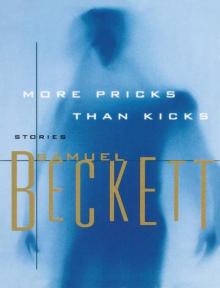 More Pricks Than Kicks
More Pricks Than Kicks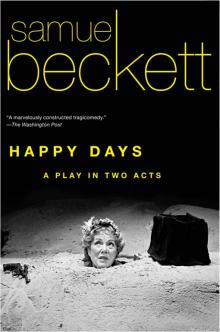 Happy Days
Happy Days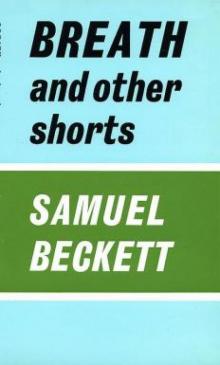 Breath, and Other Shorts
Breath, and Other Shorts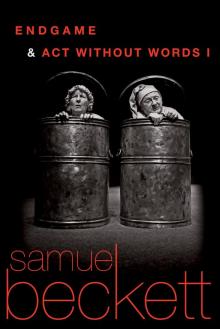 Endgame & Act Without Words
Endgame & Act Without Words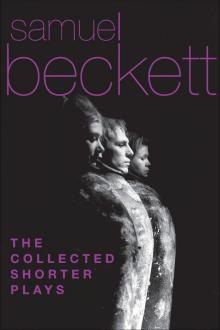 The Collected Shorter Plays of Samuel Beckett
The Collected Shorter Plays of Samuel Beckett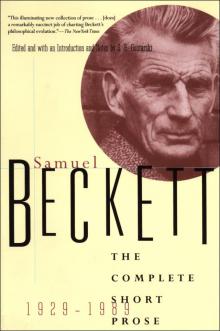 The Complete Short Prose, 1929-1989
The Complete Short Prose, 1929-1989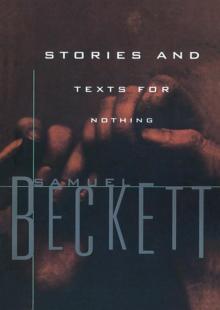 Stories and Texts for Nothing
Stories and Texts for Nothing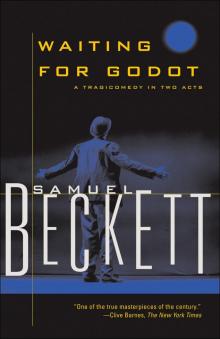 Waiting for Godot
Waiting for Godot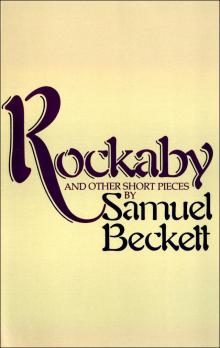 Rockaby and Other Short Pieces
Rockaby and Other Short Pieces First Love and Other Shorts
First Love and Other Shorts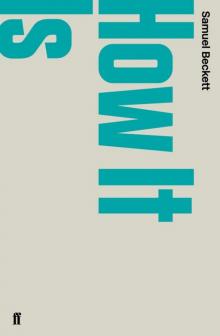 How It Is
How It Is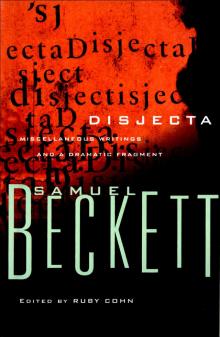 Disjecta: Miscellaneous Writings and a Dramatic Fragment
Disjecta: Miscellaneous Writings and a Dramatic Fragment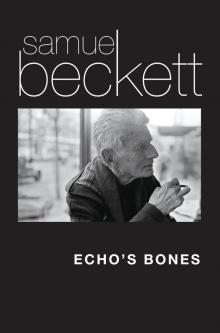 Echo's Bones
Echo's Bones Texts for Nothing and Other Shorter Prose 1950-1976
Texts for Nothing and Other Shorter Prose 1950-1976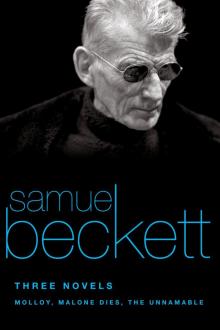 Three Novels
Three Novels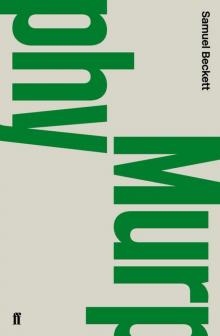 Murphy
Murphy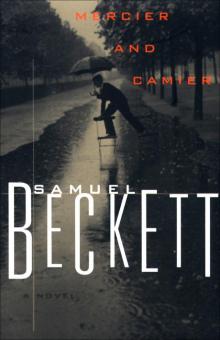 Mercier and Camier
Mercier and Camier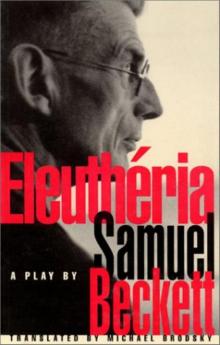 Eleuthéria
Eleuthéria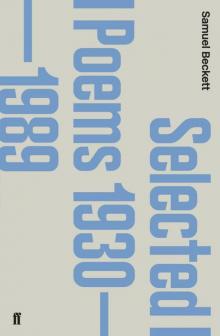 Selected Poems 1930-1988
Selected Poems 1930-1988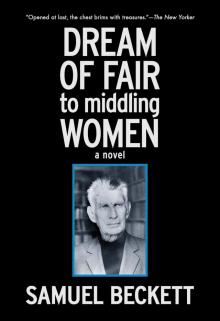 Dream of Fair to Middling Women
Dream of Fair to Middling Women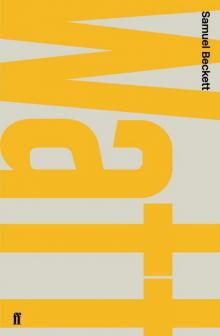 Watt
Watt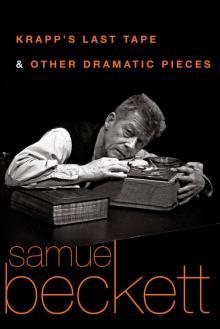 Krapp's Last Tape and Other Dramatic Pieces
Krapp's Last Tape and Other Dramatic Pieces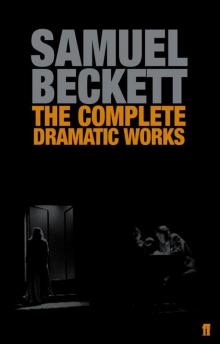 The Complete Dramatic Works of Samuel Beckett
The Complete Dramatic Works of Samuel Beckett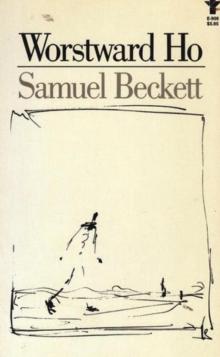 Worstward Ho
Worstward Ho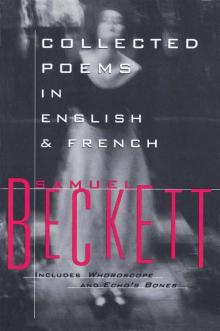 Collected Poems in English and French
Collected Poems in English and French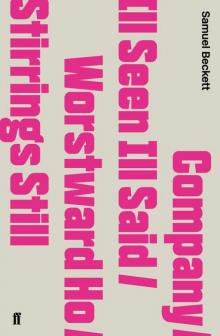 Company / Ill Seen Ill Said / Worstward Ho / Stirrings Still
Company / Ill Seen Ill Said / Worstward Ho / Stirrings Still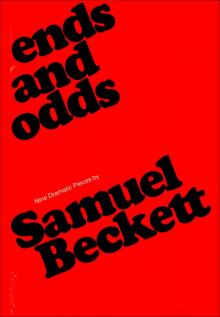 Ends and Odds
Ends and Odds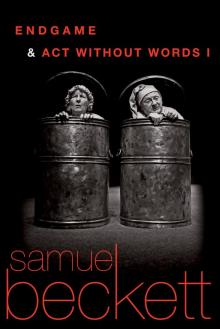 Endgame Act Without Words I
Endgame Act Without Words I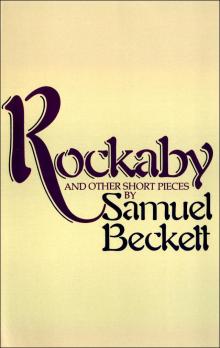 Rockabye and Other Short Pieces
Rockabye and Other Short Pieces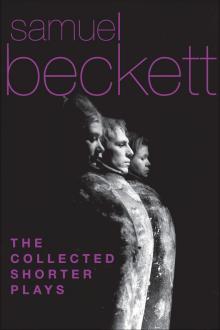 The Collected Shorter Plays
The Collected Shorter Plays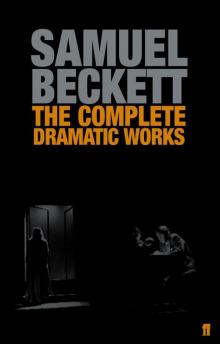 The Complete Dramatic Works
The Complete Dramatic Works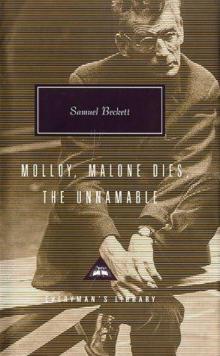 Three Novels: Malloy, Malone Dies, The Unnamable
Three Novels: Malloy, Malone Dies, The Unnamable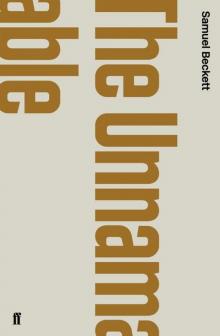 The Unnamable
The Unnamable